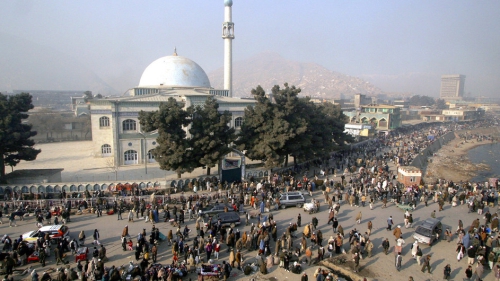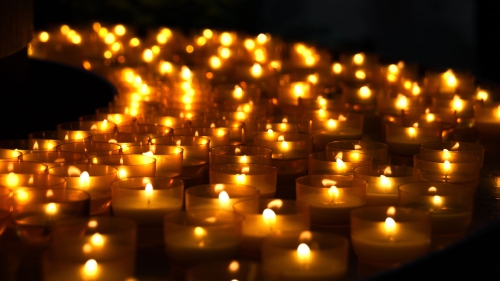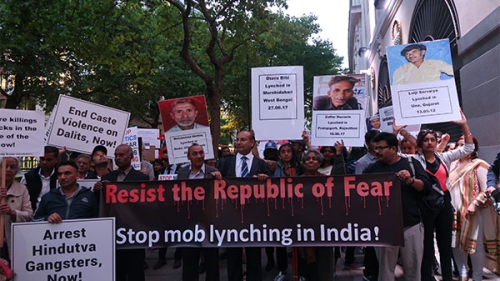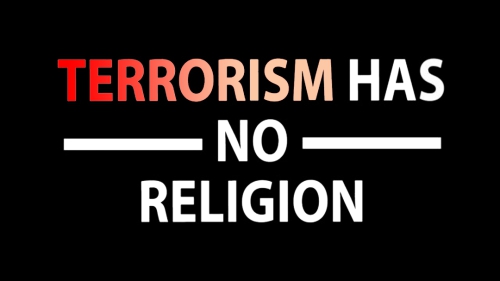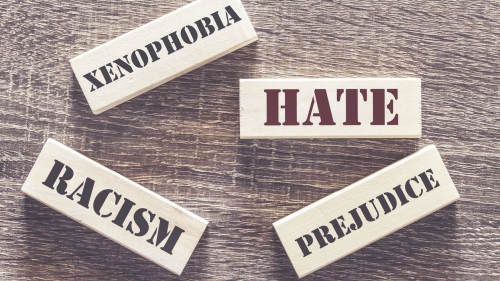Religion and the Secular Order
 |
In the closing days of December, the New York Times columnist David Brooks announced his choices for the most important political essays of the year.
Common to the majority of the essays chosen was the idea that America is at war not with international terrorism, not with Iraqi insurgents, not with Islamic fundamentalism - but with Islam itself, a world religion rendered problematic by its failure to honor the distinction between church and state, a failure that makes reconciliation with the secular order of modernity impossible. Indeed, one of the essays celebrated by Brooks, that by the neo-con pundit Norman Podhoretz, refers to this war as "World War IV," projecting far into the future a confrontation between the United States and Islam that would serve as the heir to the Cold War, which Podhoretz understands as "World War III." None of this is terribly surprising. Pundits do say the most outrageous things. Disturbing is less the fact that such ideas are out there than the fact that they were underscored by David Brooks, one of the most visible public intellectuals in the United States, a person whose views are both read and heard - and who, in his own name, would never have dared issue such a public proclamation against Islam.
While Bush has consistently maintained that the war on terror is not a war on Islam, it is important to know that many of his most vocal supporters disagree. Central to their viewpoint is the idea that, because Islam never had a "reformation" comparable to the emergence of Protestant Christianity in the16th century, it is necessarily anti-democratic and incapable of functioning in the modern world. My own sense is that this is simply wrong. As evidence, I cite the name of Al-Ghazali (1058-1111 CE). I have to defer to the experts, however, when it comes to the important task of evaluating the liberal potential of Sufi mysticism and of ascertaining its place within Islam.
What I can do, though, is to address the wider issue of religion's place in a secular order. Two convictions guide me. First of all, I am convinced that any genuinely religious person (of whatever faith) has no choice but to view modernity with skepticism. After all, the principle of modernity is bound to the notion that human beings, instead of looking to God for salvation, should instead try to save themselves by relying on their own knowledge and inventiveness. As a result, one has to wonder whether Christian evangelicals in America remain true to religion when they proclaim a "prosperity ministry" that is based more on capitalism than on the ethic of humility and surrender to God.
That a religious person is uncomfortable with the project of modernity does not mean, however, that he has to turn his back on it. Indeed, my second strong conviction is that religion should adapt itself to the secular order, not simply because it needs to do this in order to survive, but because there is something at the heart of secular modernity that is compatible with religion and even good for it. This remains true even if one identifies the secular world as a godless world. Instead of shrinking back in horror, one has to remember that religion has always viewed the world with skepticism. The claim that the world itself is sacred, that our leaders are God's chosen ones, and that our institutions are His institutions, is an idolatrous claim that is incompatible with the spirit of true religion. This does not mean that the sacred cannot be experienced within our world, but only that, when experienced, it reveals itself as that which emanates from the Beyond. There is, in other words, a radical difference between the creator and the created. Religion owes to the secular order an ongoing critique of the latter's assumption that the world is self-evidently given (and thus has no relationship to a creator). But to criticize the secular worldview is not to stand totally outside of it. After all, it is the secular assumption that the world is without God that throws everything open to question in the first place. A godless world serves the religious person as a constant reminder that the truly sacred exists only in the Beyond. To yearn after the sacred one must be well aware of its absence. Idolatry, not secularism, is the biggest threat to religion.
What, one will ask, is the "beyond" of which religion speaks? It is first and foremost that which lies beyond the possibility of any merely human understanding: that God, who created all things in love, created both me and my most bitter enemy. The very one I hate and call "evil" is one whom He yet loves. Who could possibly understand such a thing?
And what is religion itself but the discovery that this, the humanly incomprehensible, is something that can yet be understood - not by an understanding that is our own, but by an understanding that is God's and is bestowed upon us. In the light of this understanding, the very world which is discernibly hell is revealed in its truth as a heavenly world, yes, even this world in which those who have power drop bombs not only on their enemies but on whatever innocent ones happen to be standing near.
But because this understanding is not ours, it always disappears as quickly as it shows itself. Ours is the world of human understanding. It is an irredeemably secular world, in which the spirit has to remain free if it is ever to commune with the world beyond.
The distinction between church and state, which is often portrayed as an attempt to marginalize religion by making it into a purely private affair, actually grew out of the effort to preserve, in the face of the fierce competition between warring sects of Christianity, the freedom that constitutes the condition of true religiosity. What was crucial was the religious insight that religion imposed by political power is not true religion. A believing Muslim might want to add to this the observation that true religion must ultimately be universal religion: not only must it be freely chosen, but it must hold itself free of the idolatry that gives birth to sectarianism in the first place.
Once this point is thoroughly comprehended, we are able to see that the real issue is not what separates Christianity from Islam. Instead, it is what time and again intervenes to separate both the Christian and the Muslim from the truth of religion as such. To be precise, it is that human impulse towards idolatry which turns faith into its opposite: the dead literalism of the fundamentalist (whether Christian or Muslim; Jew, Hindu, or Buddhist). Fundamentalist fights fundamentalist, a continuation of the warfare that has always been engendered by idolatry (the contention that God can be either "mine" or "yours"). In contrast to the zealots who fight, truly religious people live with one another in peace and harmony, secure in the knowledge that the inner truth of religion is always one and the same. Because it is the truth of the Beyond, it can never be contained by any human institution. Where Christianity and Islam come together is where both yearn for a truth that is situated beyond their own best theological formulations.
Who understands this better than the prophet, the one who has learned what he must say to the world only by having undergone the pain of being cast out of it? To the degree that the world is experienced as the dark pit into which Joseph (and with him every prophet thereafter) has been thrown by his brothers, it can hardly be afforded the status of a divinely ordained order situated beyond the possibility of question and critique. Our own dark pit is the secular order that constitutes our contemporary destiny. Its very darkness is the source of the profound yearning that gives birth to religion. God has abandoned us to freedom. On the negative side, what this means is that we fight ruthlessly with one another in our constant quest for money and power. The result is fear, which makes an utter mockery of our freedom.
On the positive side, freedom is the condition of all understanding, both of what we gain for ourselves and of what we have bestowed upon us. By exercising our will, we discover the need to surrender it into its ground and condition. Only by surrendering it can we find the way out of fear and into the deepest dimension of our freedom.
The secular order represents an opportunity for religion as much as it represents a barrier. Who after all are the true Christians? Are they the church-attending Americans who, certain of their righteousness, preach a Gospel of war and hatred? Or are they the secularized Europeans, who struggle with their own skepticism and seek a world, united under one law, which is dedicated to the project of peace? Who are the true Muslims? Are they the ones who enslave their women, insist upon outward conformity in all things, and regard the secular order as such a threat that they unleash against it the full force of jihad? Or are they the ones who have advanced beyond literalism, dispensed with the idolatry of public acts, and learned to live in the faith that it is God who rules and not the devil?
The secular order can hardly be the goal of religion. But there is nothing in it to fear. Its freedom, the consequence of Divinity's withdrawal into the Beyond, is the condition of spiritual awakening: the realization that we are destined to follow where God has already gone. No religious denomination has a monopoly on the liberating truth of religion as such. There is no war to be fought. The demons will destroy themselves. The innocents they slaughter will receive their redemption beyond the pale of our understanding - which is why religion will always remain a quest.
Joseph P. Lawrence is Professor of Philosophy at College of the Holy Cross in Worcester, Massachusetts, USA
Reference:
1 David Brooks, "The Hookie Awards," New York Times, December 25, 2004 and "Hookie Awards, Part 2," New York Times, December 28, 2004.
2 This is stated perhaps most explicitly in Holland Daze, "The Dutch rethink Multiculturalism," The Weekly Standard, December 27, 2004.
3 Norman Podhoretz, "World War IV: How It Started, What It means, and Why We Have to Win," Commentary, September 2004.
Source: Zaman
Related Suggestions
Peace!
To accomplish these two goals the USA supports governments that are able to control their populations while opening their markets to US goods and services. Any government that closes its markets to US businesses is usually considered malignant by the US government and diplomatic and military hostilities follow. Hence Islam is not the enemy but the refusal of Muslims to follow the US lead in its economic ideals.
In support of my conclusion we have to look at countries like Pakistan, Saudi Arabia, Kuwait, the Emirates and Indonesia. All Muslim countries or regions with open markets to us goods and they are all considered allies, we will continue to support those nations as long as they keep their regions stable, control their populations, and have open markets to US businesses.
Here in the states the Hindu, Buddhists, Muslim, Christian and Atheists are welcome as long as they able to turn a profit because at the end we all know that the one with the most toys at the end of the game wins and beats the crap out of everyone else.
the world change alots and only high level of scholarship in Islam who can treat and connect the dots between the source of Islam and what's new in our lives. unfortunatly! those scholars doesn't come to NY. some of them they don't have the right to be in US!!! "land of the freedom!!!" add most of them doesn't speak the language, plus they can not know if those who translate their books understood the American culture or not! neither they can know is their translations close to the meaning of what they say? or they are just bunch of kids fighting for who gonna translate for the sheikh...
the problems that we face in our time are alots! if we are not gonna work to minimize them, they will not get fix by themselves. about those who have no clue what's Islam about and bark behind the US politicians for reform and change, they are out of touch and you shouldn't care to them at all. anyway you take it, their real value is zero in this equation. they just want be heard and seen as some so called mosslims who can be hired by those who are conspiring on Islam.
May Allah help us? without His help the Prophet was not gonna have the hearts of his followers together. we see it clear now! "if you spent all what's on Earth to make their hearts together, you won't make i
Most of the time we fail to realize that culture is different than religion. That is why when we see arabs kiss their chicks, we think it is the muslim culture. The western media is champion in finding the bad sides of Islamic nations and try to proof that this is what Islam is all about. Unfortunately, there are some muslims (!) think, Islam needs to be changed. Because, what applied 1400 years ago can not be applied at the present time. For example Islam needs to be modified in NY. My humble request, can someone please tell me what are the things needs to be fixed in Islam?
I was a bout cutting my reading in half and critic the author as someone who practice the so called phylosophy! by curiousity I finished reading to find out he is professor of phylosophy. no wonder that your understanding of religion comes from the same understanding of Marx of it. if you continue down the road the way you are, you will be with no doubt a so called Atheist..if you not already there.
thank you for giving a push to sufism the way the neo-con planed! that's suppose to show to smart readers, how far you are from the neo-con ideology...
the problem of those who practice the so called phylosophy believe that the theory who says "the so called phylosophy is just a resume of their time and location!!!!!!!" but when it comes to a western phylosophers, studing Islam was never resolved following this theory. otherwise they will never rely on the garbrage information that they get. the Real Islam is not located in the west, neither a product of our time! we should be very very carefull on how to study something that doesn't belong to our location and time. we can say whatever and make it looklike saying something important! but inside us we know ourselves when we are not expert in understanding something that doesn't belong to our native environment...
For practicing Muslims Islam is a way of life - every human endeavour is within the preview of the faith.
He makes note, that seculare order seperates religion and state snd he rounds off the argument it is only for more good, since it will bring more faith out of you. I can't buy the story, since nobody will say let oppressors rape our dignities, so that we will learn to resist.
But in utrn, if we let such thing to pass by, it would only become routine on the favour of opposite side.
Beside all this argument, the author try to make lateral comparison for Islam and christianity. Unlike christains, muslims are excepted to protect the religion of others,beside their own.
Now that is society conscious, which can be interpreted as the 'Manifestation of the religion of political power'. If such manifestation is right, muslims are expected to obey such power centres and not, they can very will create new power centres. Thats not the case with christainity.
They never had power centres in first place.Then they influenced rulers, then the church became the powercentres, they made forbidden legal. Now, they lost the power but willing to make any adjustment to have the taste of it.
If secularism is good for christains,probably author should stop there, by making lateral comparison he not to only misleads people on islam,he has only revealed his limitations in understanding Islam.
As for Islam.....I believe it is different than other religions.....because Islam does not categorize life into compartments, such as secular or religious. Rather it tells one and gives the guidance to live a "righteous life"....whether it be in the practice of explicitly religious observance...or that which is deemed secular....When one is engaged in acts which are of a purely religious nature, one is enaged in a search for the higher truth, or as we Muslims believe, involved in a conversation with God....But what is one to do when one has achived some level of insight into the truth....What good is the search for truth if it is not used to guide ones actions in the day to day life that is lead?.....And that is the true aim of Islam.....To make it a guiding force in everything we do, every step we take, in every decision we make. A Muslims path is to be guided by the highest standards of morality and ethics...As such there is no need for seperation of the "secular" in Islam(if there be anythig which can indeed be deemed secular in Islam) As such there is no need for a seperation of "Church and State" in Islam....for there is no Church in Islam to seperate, unless one is talking about the removal of morals and ethics in public life, politics, and life in general.









